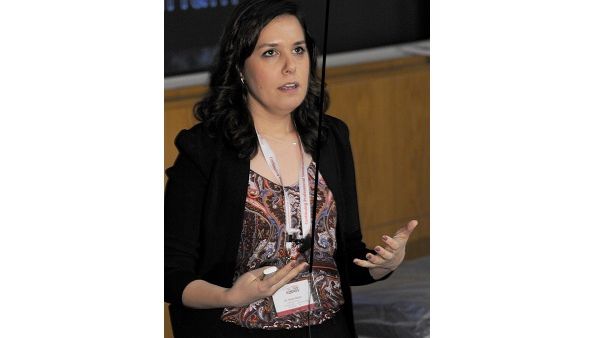WCM-Q Grand Rounds Hears How to Safely Restrain Agitated Patients

Strategies for safely managing agitated patients were discussed at the latest installment of Weill Cornell Medicine-Qatar’s (WCM-Q) Grand Rounds.
WCM-Q welcomed back Dr. Rana Biary, a member of the college’s first graduating class in 2008, to deliver the presentation, in which she explained how to safely identify and restrain patients who arrive at hospital in an advanced state of agitation, posing a risk to themselves and healthcare providers.
Dr. Biary, who is now assistant professor and director of the medical toxicology fellowship at New York University, said: “In an emergency department you may encounter patients who are agitated to the point of violence. They might be screaming at you, cursing, spitting, punching, kicking or grabbing at you. To protect them, yourself and others it is crucial to know how to restrain them quickly and safely.”
Dr. Biary used role play to show how to properly restrain an agitated patient, which she explained requires five people. Care should be taken not to apply pressure to a patient’s neck and they should never be restrained in a position that prevents them from breathing, she said. Once an agitated patient has been safely restrained an appropriate sedative can be administered to allow treatment to begin.
Dr. Biary said that the key to safely managing agitated patients was not related to knowing general self-defense techniques, and that being physically larger and stronger than the patient is not necessarily an advantage. Instead, healthcare workers should find safety in numbers and follow their training.
Dr. Biary said: “There are many examples of very fit, strong doctors being injured because they thought they could handle a patient alone. That is dangerous and wrong. The way to safely manage an agitated patient is to follow your training: first call for help, then approach the patient with as many people as possible, know the techniques for restraining a patient without causing injury to anyone and know which type of sedative should be used.”
The presentation also discussed how to identify and manage hyperthermia (elevated body temperature), which is common among agitated patients, especially if they are under the influence of narcotics.
The lecture was accredited locally by the Qatar Council for Healthcare Practitioners-Accreditation Department (QCHP-AD) and internationally by the Accreditation Council for Continuing Medical Education (ACCME).
Background Information
Weill Cornell Medical College in Qatar
Weill Cornell Medicine - Qatar is a partnership between Cornell University and Qatar Foundation. It offers a comprehensive six-year medical program leading to the Cornell University M.D. degree with teaching by Cornell and Weill Cornell faculty and by physicians at Hamad Medical Corporation (HMC), Aspetar Orthopedic and Sports Medicine Hospital, the Primary Health Care Corporation, the Feto Maternal Center, and Sidra Medicine, who hold Weill Cornell appointments. Through its biomedical research program, WCM-Q is building a sustainable research community in Qatar while advancing basic science and clinical research. Through its medical college, WCM-Q seeks to provide the finest education possible for medical students, to improve health care both now and for future generations, and to provide high quality health care to the Qatari population.






